 YEARNING FOR AEGEAN LIGHT. The Swiss Committee for the Return of Parthenon Marbles presents this new documentary film, produced by the Committee and directed by Gary Grenier. Many people are either misinformed or undecided about the need to reunify the Parthenon, a mutilated work of art and the major symbol of Europe’s common cultural heritage. This film will allow you to have an informed opinion.
YEARNING FOR AEGEAN LIGHT. The Swiss Committee for the Return of Parthenon Marbles presents this new documentary film, produced by the Committee and directed by Gary Grenier. Many people are either misinformed or undecided about the need to reunify the Parthenon, a mutilated work of art and the major symbol of Europe’s common cultural heritage. This film will allow you to have an informed opinion.
Category: GREEK DIASPORA
News about Greeks around the world
-
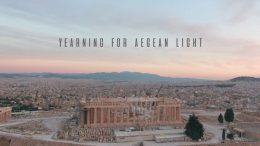
Yearning for Aegean light
-
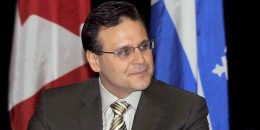
Greek-Canadian Senator Housakos Wants Canadian Government to Recognize Pontian Greek Genocide
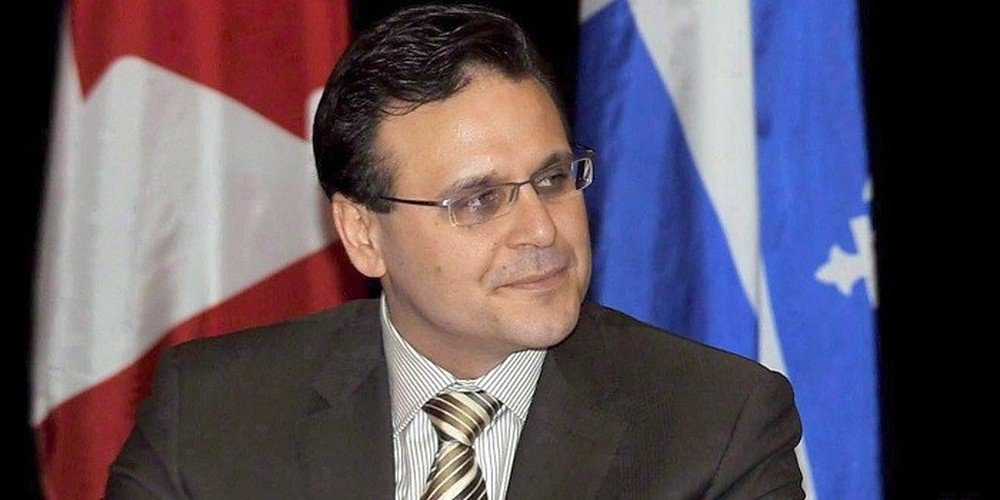 During a recent speech in the Canadian Senate, Greek-Canadian Senator Leo Housakos addressed his colleagues in efforts to bring to vote the need for Canada to recognize the Genocide of the Pontic Greeks from 1916 to 1923 by Turkey.
During a recent speech in the Canadian Senate, Greek-Canadian Senator Leo Housakos addressed his colleagues in efforts to bring to vote the need for Canada to recognize the Genocide of the Pontic Greeks from 1916 to 1923 by Turkey.Most people are not aware of the group of ethnic Greeks called Pontic Greeks. They are ethnic Greeks who once lived along the shores of what is now known as the Black Sea. Greek merchants originally settled in the area over 3,000 years ago, establishing trading posts along this shoreline and eventually the outposts grew into villages, towns and cities. This area was known as Pontus.
From 1914-1923 their prosperity and peaceful way of life came to a tragic end when over 353,000 Pontic Greeks perished during the Greek Genocide at the hands of the Ottomans, neo-Turks and Kemalists. Their fate was later sealed following negotiations at Lausanne and an ‘Exchange of Populations’ between Greece and Turkey, which resulted in all Orthodox Pontic Greeks being forced to uproot and repatriate to Greece.
According to transcripts published on protothema.gr, Senator Housakos recently presented the “Motion to Call Upon the Government to Recognize the Genocide of the Pontic Greeks and Designate May 19th as a Day of Remembrance” calling on the government of Canada to “(a) recognize the genocide of the Pontic Greeks of 1916 to 1923 and to condemn any attempt to deny or distort a historical truth as being anything less than genocide, a crime against humanity; and (b) to designate May 19th of every year hereafter throughout Canada as a day of remembrance of the over 353,000 Pontic Greeks who were killed or expelled from their homes.”
“…We must be clear that this is a tragic fate — a genocide. Not only have the ghosts of the Pontic Greek Orthodox earned the right to confront their murderers, but to paraphrase the words of a wise man, those who forget the tragedies of the past are doomed to repeat them in the future. And indeed, the world chose to ignore the genocide of Armenians and Pontians, and we were forced to confront the Nazi Holocaust of European Jews as a result. We ignored Rwanda and are now dealing with genocides like that of the Yazidis being carried out by ISIS,” Housakos stated.The senator added that his motivation for bringing the motion to the table is to acknowledge history, heal, learn from what has occurred and most importantly be sure that it does not repeat itself.
-

Hellene, Romios, Greek: Collective Identifications and Identities
 “Έλλην”, “Ρωμηός”, “Γραικός” (Hellene, Romios, Graikos [Greek]): Three terms which by and large refer to the identity of the Greeks in the long course of History. The Greek people have been identified by many ethnonyms, with the most common being “Hellene” (Greek: Έλλην), while the name “Greeks” (Latin: Graeci) was used by the Romans, which gradually entered European languages through its use in Latin. Roman or Rhomaios or Romios is the name by which the Greeks were known in the Middle Ages, since virtually all Greeks were Roman citizens after 212 CE, whilst during Ottoman rule the name of the Orthodox Christian community was Rūm millet (Roman nation).
“Έλλην”, “Ρωμηός”, “Γραικός” (Hellene, Romios, Graikos [Greek]): Three terms which by and large refer to the identity of the Greeks in the long course of History. The Greek people have been identified by many ethnonyms, with the most common being “Hellene” (Greek: Έλλην), while the name “Greeks” (Latin: Graeci) was used by the Romans, which gradually entered European languages through its use in Latin. Roman or Rhomaios or Romios is the name by which the Greeks were known in the Middle Ages, since virtually all Greeks were Roman citizens after 212 CE, whilst during Ottoman rule the name of the Orthodox Christian community was Rūm millet (Roman nation).The proceedings of the international conference “Έλλην”, “Ρωμηός”, “Γραικός”: Collective Identifications and Identities, which took place from 19 to 21 January 2017, shed broad light on the complex process of the construction of these collective identifications.
The speakers of the Conference, which was organized by the Department of History and Archaeology of the National and Kapodistrian University of Athens (NKUA) and was one of the celebratory events for the 180 years since the establishment of the NKUA, noted in particular the overlapping and the intermittent changes in the meaning of these identifications in the stretch of time and the longue durée: from ancient Greece to the Hellenistic and the Byzantine world and then to the Latin/Venetian and the Ottoman periods as well as the first century of the Greek nation-state and in the stretch of a space that exceeds the limits of metropolitan Greece and includes the Diaspora and the Balkans.
Overall, 43 papers were presented at the conference, which were divided into three main focus areas: a. Identifications and identities in the ancient world; b. The empires and c. The long nineteenth century. The discussion that followed the presentations of each panel of speakers contributed substantially to the approach and better understanding of the multiple identifications in the Greek world.
The subject of the conference followed extensive reflections on issues of ethnic identity brought about by the drastic political and economic changes, as well as the surfacing of new social and cultural phenomena that have taken place in the last decades. “These issues were found at the epicenter of scholarly interest and Public History, thus provoking a strong discussion and a particularly interesting production of academic works. The pertinent research on primary sources has enriched our knowledge, has sharpened our historical vision, and has led to new critical perspectives, which have broadened our way of thinking on the historical process of concepts that have been used as collective identifications both in international and in Greek academic literature, as the conference organizing committee has mentioned.
The organizing committee comprised members of the academic staff of the Department of History and Archaeology. Conference participants consisted of members of the NKUA as well as universities and research institutes of Greece and other European countries (Austria, Bulgaria, Cyprus, Germany, Italy and Romania) and the USA.
Keynote Speaker and Chairwoman of the Conference, Professor of Modern History in the Department of History and Archaeology, Olga Katsiardi-Hering, asked by Greek News Agenda* what the dominant connotations of the terms Hellene, Greek and Romios were, answered as follows:
“As shown by the Conference announcements – and depending on the time and place in question – these terms described national, political and religious identities in antiquity, but in multinational political groupings of the Hellenistic, Roman, Byzantine and Ottoman eras too, as well as in the Diaspora. The term Greek/Greco/Grieche for a long period and up until the mid 18th century also referred to the Eastern Orthodox faithful. In the same vein, according to Ottoman and Ecumenical Patriarchate historical sources, the term Romios/Rum could have referred to the Orthodox Christian subjects of the Ottoman Empire as well as to the Patriarchate faithful. Gradually however and mostly from the 17th century onwards, the terms Hellene/ Greek/ Romios largely became synonymous, describing Greek identity. From the time of the Greek War of Independence (1821), Hellenic Republic and Hellene became the dominant terms defining the fledgling Greek nation-state and its nationals”.
-
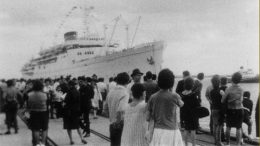
Migration Routes: First Greek Australian Archive Underway
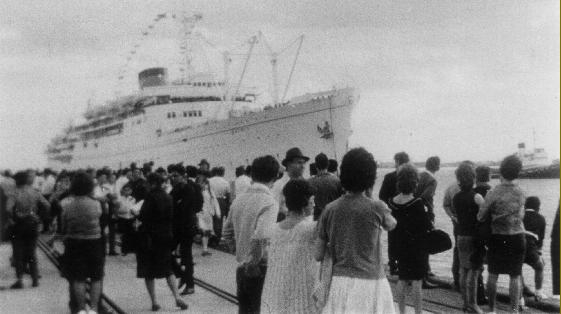 How has the large Greek community in Australia been formed? How did the Greeks travel to Australia in the 1950s and 1960s? What were conditions like on ships like The Patris, The Flaminia and the others? What do Greeks remember of that experience? What happened when the boats arrived in Circular Quay?
How has the large Greek community in Australia been formed? How did the Greeks travel to Australia in the 1950s and 1960s? What were conditions like on ships like The Patris, The Flaminia and the others? What do Greeks remember of that experience? What happened when the boats arrived in Circular Quay?The generation of Greeks that arrived in the 50s and 60s is fast disappearing. Their stories of adversity, strength, and progress to affluence are soon to be lost with them. Determined to not let this rich part of Australian and Greek history fade away with death notices, Associate Professor Nicholas Doumanis from the School of Humanities & Languages in the Faculty of Arts & Social Sciences at the University of New South Wales – with the support of the State Library and University of NSW – has set to document the fast disappearing first generations of Greek Australians.
As Doumanis clarifies, pre-war migration populations’ history has been well documented; however, there is a significant gap in post-war history, which saw the largest wave come from Greece to Australia. This wave saw mainly village and poor people come to the Lucky Country, either fleeing war or seeking better living conditions.
As pivotal as the contribution of the Greek population has been to what modern Australia is, “Australian historians don’t really know what to make of it, therefore it does not figure in the Australian history writing,” Professor Doumanis told Neos Kosmos. “Don’t forget,” he stresses, “Greece don’t genuinely consider us as part of their history. It’s upon us to show that we are part of the Australian history and a significant part of the Greek diaspora experience“.
The project aims to capture the unique oral histories, memoirs and memorabilia of hundreds of Greek Australians, creating a publicly accessible archive, to illuminate understanding of the journey of Greek immigrants and how these experiences have shaped Greek-Australian memory and its cultural heritage. The uniqueness of the project is that for the first time the story of migration will be told through the personal experiences of the each individual and thus history will be captured through the voice of those that lived it. The project will historically link migrant experiences with various Australian records enabling a greater academic and social understanding of the impact of migration in Australian.
“The idea is for this pilot project starting from Sydney’s Greek community to be adopted by other states as well. We are also looking into creating a book and an on-line data base,” Doumanis continues. An oral archive featuring interviews with about 200 Greek Australians will also be available to the public.
The original fund was almost enough to set the foundations of this project, but in order for it to be realized, additional financial support is required so as to: build a rich archive that will house the documents of various Greek institutions and materials that depict Greek Australian life such as photographs, films, letters and diaries; create a signature feature of 200 oral histories from first generation migrants; build an online interactive exhibition; develop online courses in Greek-Australian History that students can take as part of any degree at UNSW; enable the Archive to be accessible to any scholar, both locally and internationally, for future research and teaching.
More about Professor Doumanis’ project: Greek odyssey; The University of New South Wales Sydney: Greek Australian Archive; More about Greeks in Australia: Anastasios Tamis: The Greeks in Australia (2005); Professor Nicholas Doumanis’ forthcoming book (with Antonis Liakos): The Edinburgh History of the Greeks, 1909 to 2012: A Transitional History
-
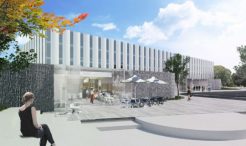
A new Greek Centre on the Yarra
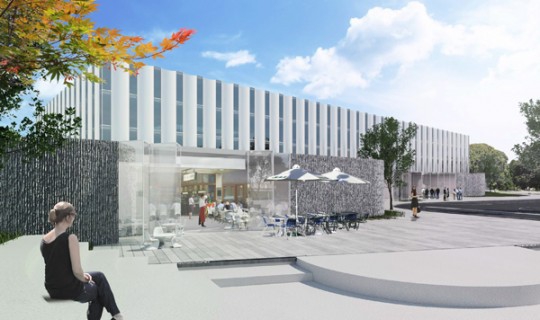 The Greek Community of Melbourne (GCM) is pleased to announce a plan that will not only contribute to the development of the site at Bulleen, but will financially strengthen the GCM and create new facilities and services for all Greeks in Melbourne. The Plan focuses on the Community’s core activities and services and brings together organizations from across Melbourne in a landmark development called “Greek Centre on the Yarra».
The Greek Community of Melbourne (GCM) is pleased to announce a plan that will not only contribute to the development of the site at Bulleen, but will financially strengthen the GCM and create new facilities and services for all Greeks in Melbourne. The Plan focuses on the Community’s core activities and services and brings together organizations from across Melbourne in a landmark development called “Greek Centre on the Yarra».“The Plan is visionary and testament to the hard work of my fellow Board members, “ said GCM president Bill Papastergiadis of the Proposal. “The Plan resolves the significant difficulties associated with the Bulleen site and will create a space for Greek organisations to call home. The Plan compliments the work of the GCM in its CBD Centre and across its broad program of activity.”
The Plan is to:
1. Secure the removal of the onerous overlays on close to 2.6 hectares of the site. This is something that the GCM has been working on for almost two years with specialist consultants.
2. Sell 1/6th of the site for $11 million to a developer brought forward by consultants who plan to build housing onsite.
3. Collaborate with Government on the creation of wetlands on the flood prone and hence unusable part of the land. The earthworks and landscaping necessary estimated to cost $2 million dollars will be paid for by the developer and Government. The ongoing maintenance of this land will be the responsibility of Government.
4. Partner with an appropriate organisation on the development of the GCM retained part of the site, for the construction of an iconic Greek Centre on the Yarra as conceptualised by one of Australia’s leading architects, Billy Kavellaris of KUD architects.This new Centre will house:
a. Aged Care facilities
b. Education facilities allowing the GCM to bring together a number of campuses in the region and save up to $100,000 per annum in rent
c. Community meeting, gallery and function spaces that will offer a tangible location for community organisations to call home with spaces to meet, celebrate and exhibit their archives and collections.
d. Retail spaces for a café and or restaurant
e. On the balance of the GCM land that remains under a flood zone, the plan is to construct sporting fields that are in much demand by local clubs and schools. These are of little impact to the construction of the Centre.
5. It is important to stress the financial considerations for the GCM associated with this plan. As proposed, the GCM will net approximately $10m from the sale, receive an ongoing profit share from the Aged Care facility once operational, receive rental from the retail outlets and from the sporting field and save close to $100,000 annually from school rentals that will no longer need to be paid. Furthermore, with regard to the construction of the new building, a joint venture with a third party will be sought to fund the construction.According to Mr. Papastergiadis the development of the Bulleen site has being a constant request raised with him by many community leaders. “Create a space for us to meet and keep our archives, then we will invest in it’ is constantly said to me” says Papastergiadis. “Not only we are creating a space which is needed by the community, but the project adds so much more to the social and cultural fabric of the community in Victoria. We will work with all of the key stakeholders to ensure that the needs of Greek Australians are appropriately met. This project along with the acclaimed 15 level Greek Centre in the CBD now defines Melbourne as the global Hellenic HQ.”
“The Board’s proposal is an ideal solution to a perennial dilemma with respect to the development of the old Bulleen Drive-In site that has preoccupied the Greek Community for 30 years,” said the General Secretary of the organisation Costas Markos. “This multifaceted project will provide a cultural and educational infrastructure to accommodate the wealth of creativity within our community. The addition of an aged care facility will assist immensely to the current lack of facilities and services for the elderly within our community. The Board of the GCM strongly believes that the proposal will be adopted unanimously by the GCM members and will also be embraced by other Greek organisations.”
The GCM’s Vice President Nikolaos Koukouvitakis pointed out “that this is a dream coming true for the community… we have a unique opportunity to develop Bulleen. This is a project for all Greeks and the whole community must support it.”
Theo Markos, GCM’s Vice President and Education Coordinator, said: “As an active member of the GCM since the early 80s, I am familiar with the site and its problematic history. For the first time in 30 years, the circumstances are such that will allow us to constructively use this piece of land in a way that will benefit the entire community. Voting in favor of the proposal is the only way that will ensure the implementation of the future plans of our organization. “
-

GCM to assist in promoting Greek medical tourism
 Despite the economic crisis, Greece is continuing to make a name for itself in the health and medical fields, and is fast becoming a popular destination for medical tourism.
Despite the economic crisis, Greece is continuing to make a name for itself in the health and medical fields, and is fast becoming a popular destination for medical tourism. On a recent trip Down Under, renowned Greek Australian fertility specialist and director of Greece’s largest fertility clinic Genesis, Dr Konstantinos Pantos met with members of the Greek Community of Melbourne (GCM) board to discuss potential ways to further the campaign to boost growth in the field.
A popular idea proposed was the prospect of organising and hosting a conference in Melbourne as a forum for Greece to exhibit its many achievements to the broader Australian community.
Amongst those joining Dr Pantos on the day were GCM president Bill Papastergiadis, general secretary Costas Markos, GCM treasurer and president of the Hellenic Medical Society of Australia, Associate Professor Marinis Pirpiris, and board members Michael Karamitos and Chris Sikavitsas.
Following on from the December 30 meeting, a follow-up Skype meeting took place on Tuesday between Dr Pantos and Orthopaedic Surgeon and Mayor of Amaroussion, Dr George Patoulis who is also leading the campaign, with Director of the Greek Centre Jorge Menidis and Mr Markos.
They reaffirmed their agreement that stronger medical, academic and trade networks, particularly in medical tourism, between Greece and the wider Diaspora would be a goal that all parties will actively work towards developing and nurturing.
“At the GCM we are happy and thrilled to cooperate with Dr Pantos and to organise the meeting in Melbourne later this year to show some of the medical achievements in Greece,” said Professor Pirpiris.
Dr Pantos was extremely satisfied by the enthusiastic and positive response he received in Melbourne, which came just after the successful conference the doctor held in New York for the further promotion of medical tourism in Greece.
If all goes to plan, the conference is expected to take place later this year in November.
-
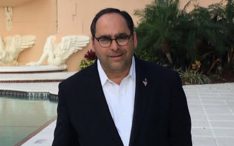
Donald Trump Appoints Greek-American George Gigicos Deputy Assistant to the President
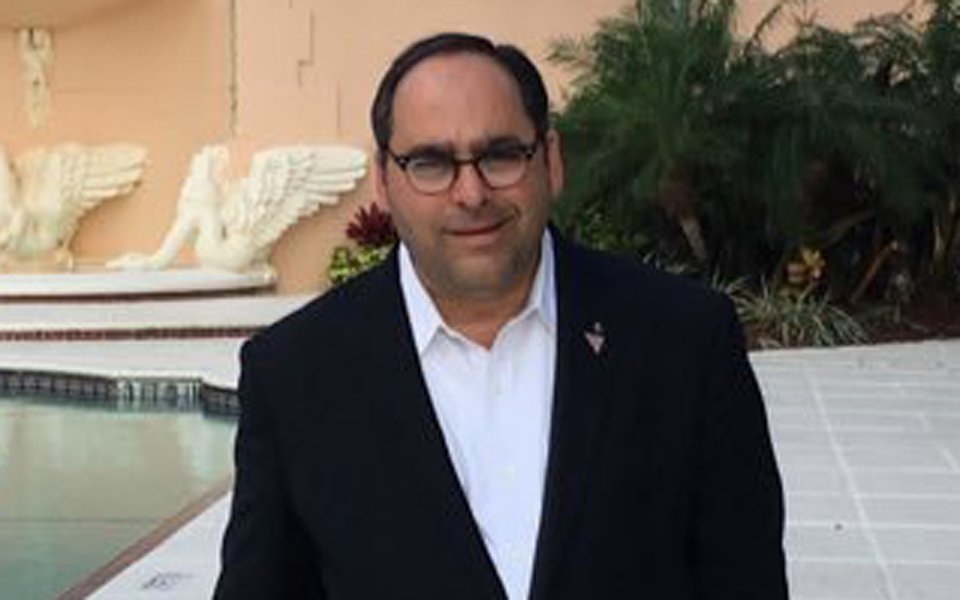 U.S. President elect Donald Trump on Thursday appointed Greek-American George Gigicos Deputy Assistant to the President and Director of Advance.
U.S. President elect Donald Trump on Thursday appointed Greek-American George Gigicos Deputy Assistant to the President and Director of Advance.Gigicos, a prominent member of the Greek-American community, was one of the first people to sign on with Trump’s presidential campaign, originally serving as the only member of the campaign’s advance team. He organized campaign events and rallies across the country, eventually managing around 100 staff members to help coordinate the rallies.
Gigicos studied at Birmingham-Southern College and began working in event planning and advance planning for political campaigns while still in school. According to Bloomberg, as a college student Gigicos worked in advance planning for the Treasury Department in the administration of George H.W. Bush. After graduating in 1990, Gigicos worked in advance and as an event planner for the Orange County Convention Center in Florida.
In 1999, Gigicos started the Telion Corporation, a communications firm specializing in event design, organization, and advance operations. As head of Telion, Gigicos worked in advance planning for President George W. Bush’s administration, his 2004 presidential campaign, and the presidential campaigns of John McCain in 2008 and Mitt Romney in 2012.
Reportedly, Gigicos, whose ancestors are from Kalamata, has in every Trump appearance tried to convince the Greek community that the new president shows an interest in Greece and the intention to promote the settlement of the Greek debt and the Cyprus issue.
-
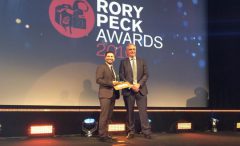
Greek-Canadian Cameraman Wins Rory Peck Trust Award for Migrant Coverage
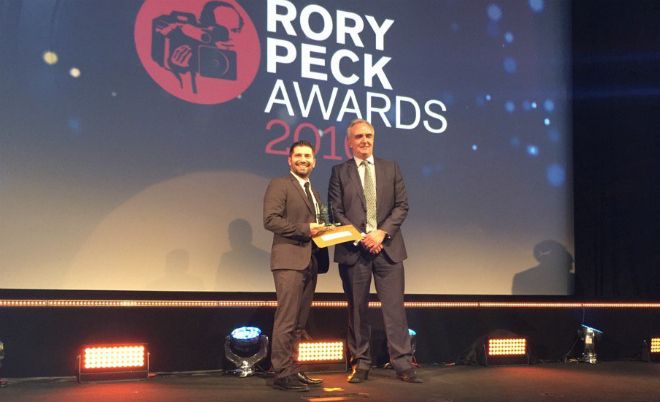 Last Wednesday AFPTV freelance news cameraman Will Vassilopoulos was awarded the Rory Peck Trust award for his work on the migrant crisis gripping Greece.
Last Wednesday AFPTV freelance news cameraman Will Vassilopoulos was awarded the Rory Peck Trust award for his work on the migrant crisis gripping Greece.Filming from October 2015 to March 2016, Vassilopoulos focused his footage on following migrants on their journey as they arrived in Greece from Turkey and were settled in various camps such as the now demolished Idomeni refugee camp in northern Greece.
His achievements do not stop there as his coverage of the migrant crisis also captured migrants’ protests when in the spring of 2016 FYROM shut its borders to Greece, bottlenecking thousands of migrants.
A seasoned Vassilopoulos was chosen for the honor of this award because his work “brought the humanity of (the crisis) home” the judges commented on the award website, adding that “It’s difficult to do something exceptional when everyone is shooting it, however tragic and important the story is, and Will really managed that.”
Shooting the migrant crisis was not without its challenges for the cameraman who said that he found that working on the migrant crisis in particular “very challenging” and that the work brought about “an emotional toll for all of us in the field. It hurts you really hard when it happens at home,” he said.
“My intentions were always to film with utmost respect for migrants, and to film them with dignity,” he added.
The Rory Peck Award has been bestowed upon freelance news cameraman and women since 1995 as a part of the Trust in memory of the freelance journalist who was killed in Moscow in 1993.
-

Greek sushi master among world’s 100 best chefs
 Greek sushi master Antonis Drakoularakos, owner of Athens restaurant Sushimou, was named among the world’s 100 top chefs at the award ceremony of the first Chefs World Summit on Sunday night.
Greek sushi master Antonis Drakoularakos, owner of Athens restaurant Sushimou, was named among the world’s 100 top chefs at the award ceremony of the first Chefs World Summit on Sunday night.Organized by the prestigious French magazine Le Chef from November 27-29 at the Grimaldi Forum in Monaco, the event included a stellar lineup of more than 500 two- and three-Michelin-starred chefs from around the world and other influential industry players.
The 37-year-old physicist-turned-chef came in last on the list that places him among the ranks of the legendary Alain Passard (first place) of L’Arpege in Paris and Martin Berasategui (second place) of the eponymous eatery in Lasarte Oria, Spain.
Drakoularakos trained in the demanding art of sushi making at the Tokyo Sushi Academy in 2014, returning to Athens to open Sushimou, located just off Syntagma Square, in November last year. In the year since it opened, the small, 12-seat sushi bar has attracted the attention of local critics and discerning diners alike.
-
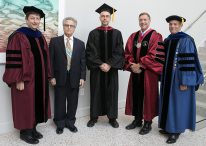
Nikolaos Panou, PhD, installed as tsantes endowed Professor in Greek Literature and Language at Stony Brook University
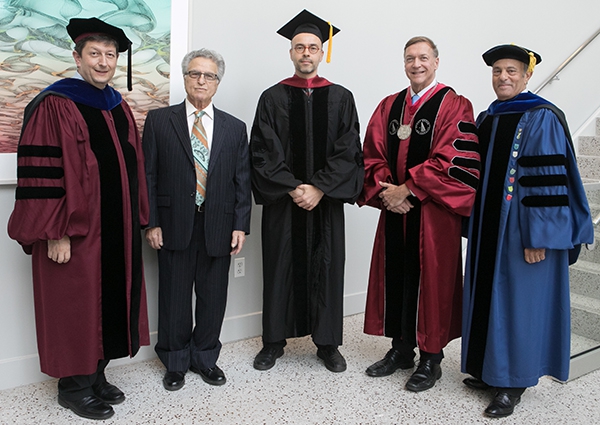 The Stony Brook community came together to celebrate the formal installation of Nikolaos Panou, Ph.D., the inaugural Peter V. Tsantes Professor in Greek Literature and Language.
The Stony Brook community came together to celebrate the formal installation of Nikolaos Panou, Ph.D., the inaugural Peter V. Tsantes Professor in Greek Literature and Language.“It is an understatement to say that I am delighted that Nikolaos Panou has been named to this distinguished professorship,” said President Samuel L. Stanley Jr. during the ceremony. “And we are grateful to Peter V. and Despina Tsantes for endowing this professorship. It will be a lasting tribute to the Tsantes family and enable us to continue to attract and retain prominent scholars in the field of Hellenic studies.”
As Assistant Professor of Comparative Studies in Stony Brook University’s College of Arts and Sciences, Panou’s current research focuses on the ways in which power and authority were conceptualized and represented in pre-modern philosophical discourse, with particular emphasis on moral and political works written from the 16th to the 18th century.
Nikolaos Panou received his Ph.D. in comparative literature from Harvard University and has been a postdoctoral fellow at the Seeger Center for Hellenic Studies at Princeton University. Before joining Stony Brook in 2014, he was a visiting assistant professor of comparative literature at Brown University.President Samuel L. Stanley Jr. explained that it is a Hellenic tradition of rigorous investigation of the hard sciences, social sciences and humanities that Stony Brook seeks to emulate, promulgate and celebrate.
“It is not only fitting, it is important that at Stony Brook — one of the top 62 research Universities in the country known for our emphasis on the study of science, technology, engineering, mathematics, and medicine — we also educate and nurture students with the values of Hellenic civilization,” he said.
Recognized for his long history of visionary generosity in providing valuable resources and leadership among Greek communities, Long Islander Peter V. Tsantes’ passion and enthusiasm was encouraged by Stony Brook’s own educational reputation and commitment toward advancing the study of Hellenic culture. He also noted that he and his family have dedicated the professorship to the memory of his adoptive mother who sponsored his trip to the United States in 1951, Aikaterini Spanou Haralambou Batuyios. “How can you forever show your love and remembrance?” Tsantes’ said of Batuyios.
Throughout Tsantes’ life, Batuyios encouraged him to give back, which led to his involvement in the American Foundation for Greek Language and Culture (AFGLC). Before long, he turned his philanthropic focus closer to home, where he formed the New York Chapter of AFGLC. He currently serves as treasurer for its executive board.
To Tsantes, the professorship was a fitting tribute to not only his adopted mother and homeland, he hopes it will spur others “toward an increased energy in philanthropy and education.” The professorship, he believes, will be the base for a plethora of Hellenic activities on campus, supported not only by his family, but also by the generosity of other members of the Long Island Hellenic community.
As holder of the professorship, Panou is invested in promoting scholarship, teaching and research in all aspects of Hellenic civilization, from Antiquity to the present.
One of Panou’s principal goals at Stony Brook is to build a stronger Center for Hellenic Studies that will serve as a forum for the study of Greek society, history and culture, and which will cultivate a comprehensive understanding of classical, post-classical and modern Greece.
“The vision is here, and so is the will, the determination and the expertise,” Panou said. “We now have to direct all of our effort — and with a great sense of urgency, I might add — to the creation of a robust, radiant, magnetic Center for Hellenic Studies that will serve as a hub for the study of Greek society, history, politics and culture that will become an indispensable point of reference within Stony Brook and beyond.”
This new professorship is yet another example of how endowed faculty build on the University’s dedication to excellence across campus. That’s why one goal of the $600 million Campaign for Stony Brook is to create a total of 100 endowed faculty positions by 2018, aimed to attract more eminent scholars and researchers and retain outstanding faculty across a wide range of disciplines.
Over the past six years, the number of endowed chairs and professorships at Stony Brook has increased more than seven-fold, to a total of 42 endowed chairs and professorships.
“At a time when the humanities are being increasingly marginalized, to say the least, the establishment of an endowed chair in Hellenic studies is an event and an opportunity of singular importance,” Panou said. “The truth is, what’s happened here at Stony Brook is the result of extraordinary actions that require inspiration, zeal, commitment, generosity and a lot of hard work.”
About Stony Brook University
Part of the State University of New York system, Stony Brook University encompasses 200 buildings on 1,450 acres. Since welcoming its first incoming class in 1957, the University has grown tremendously, now with more than 25,000 students and 2,500 faculty. Its membership in the prestigious Association of American Universities (AAU) places Stony Brook among the top 62 research institutions in North America. U.S. News & World Report ranks Stony Brook among the top 100 universities in the nation and top 40 public universities, and Kiplinger names it one of the 35 best values in public colleges. One of four University Center campuses in the SUNY system, Stony Brook co-manages Brookhaven National Laboratory, putting it in an elite group of universities that run federal research and development laboratories. A global ranking by U.S. News & World Report places Stony Brook in the top 1 percent of institutions worldwide. It is one of only 10 universities nationwide recognized by the National Science Foundation for combining research with undergraduate education. As the largest single-site employer on Long Island, Stony Brook is a driving force of the regional economy, with an annual economic impact of $4.65 billion, generating nearly 60,000 jobs, and accounts for nearly 4 percent of all economic activity in Nassau and Suffolk counties, and roughly 7.5 percent of total jobs in Suffolk County.